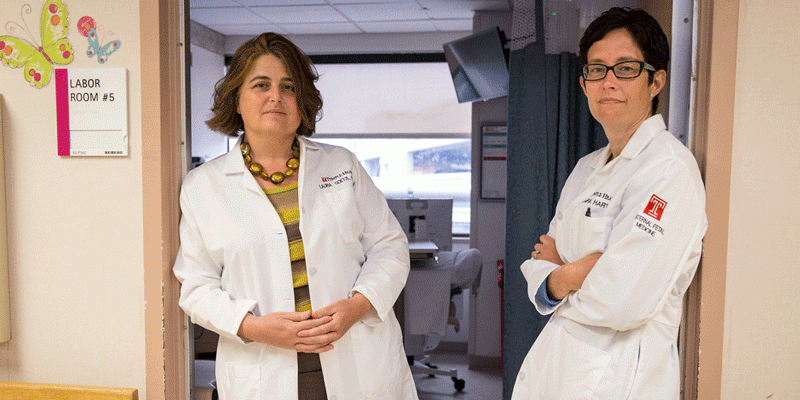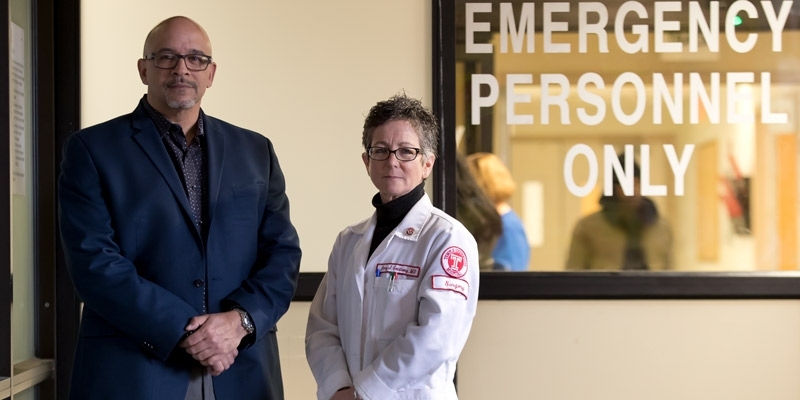Posted March 26, 2018
Powerful Temple women share advice for future generations
In honor of Women’s History Month, get to know some powerful women at Temple who are innovators and trailblazers in their fields.
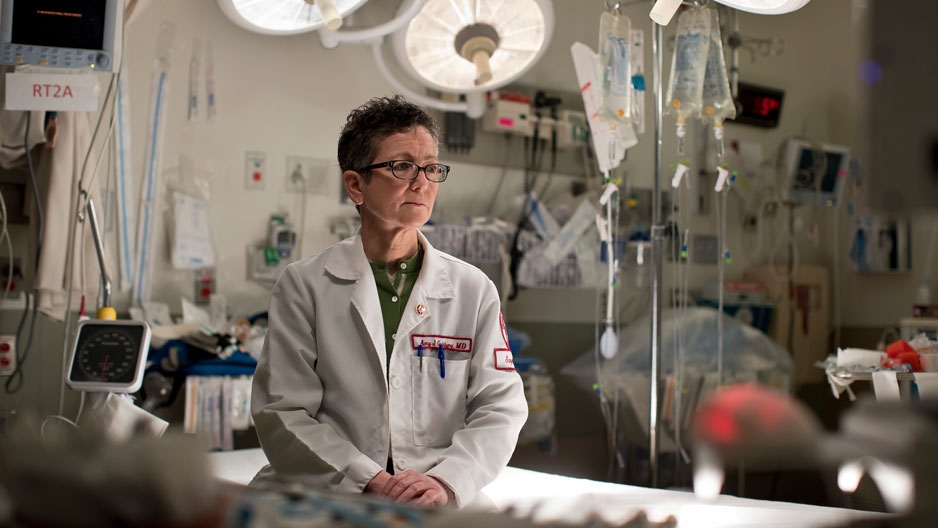
Photography By:
Ryan S. Brandenberg
Amy Goldberg, professor and chair in the Department of Surgery at the Lewis Katz School of Medicine, completed her residency at Temple in 1992.
The women who work at Temple make an indelible mark on the university and their fields every day. From Temple University Hospital to Campus Safety Services to high-ranking administrators, Temple is a place where women serve as trailblazing leaders.
In honor of Women’s History Month, get to know a few of the countless influential women here.
Amy Goldberg
Title: Professor and chair, Department of Surgery, Lewis Katz School of Medicine; surgeon-in-chief, Temple University Health System; medical director of perioperative services, Temple University Hospital
How long have you been at Temple?
I completed my general surgery residency at Temple University Hospital in 1992, then returned to Temple as an assistant professor of surgery in 1993 after completing a trauma/surgical critical care fellowship.
You are one of fewer than 20 women in the country to hold a chair of surgery position. What does that mean to you, and what’s your advice for women pursuing male-dominated professions such as surgery and medicine?
I am so incredibly proud to be the chair of the Department of Surgery at the Lewis Katz School of Medicine at Temple University. To be the chair of the very department that trained me to be a physician and surgeon is so very humbling. No matter what path you choose for your career, make sure you love it—follow your heart and your passion. As with any journey, there will be ups and downs. My advice for women pursuing male-dominated professions is to work hard, be dedicated, persevere and develop your team to assist you through challenging times.
---
Jessica Sandberg

Title: Director of international admissions, Office of International Affairs
How long have you been at Temple?
Since 2012.
What advice would you give to young women who are interested in coming to the United States for college?
My advice would be to prepare for an incredible journey. The experience will be challenging, exhilarating, frustrating, and ultimately, transformative. It will change you, shape you, toughen you up and position you for success in an increasingly global economy. It’s a choice very few people regret.
Can you share something you’ve learned in your career that helped you as a woman in a leadership role?
I’ve learned the value of creating and nurturing a network of peers, mentors and developing professionals. I lean on a variety of individuals with different strengths and talents and am able to consult them about various facets of work and life. I’ve also learned the value of returning the favor. I look for opportunities to offer public recognition and acknowledge accomplishments in the form of referrals, testimonials, public recommendations, etc. Similarly, I try to develop talent in promising young professionals by creating opportunities, offering my time and giving them a voice in decision making. Professional circles tend to be rather small. When it comes to professional and collegial development, you will reap what you sow.
---
Denise Wilhelm
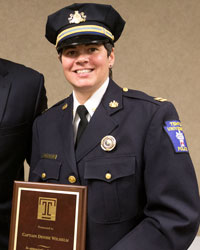
Title: Deputy chief of operations, Campus Safety Services
How long have you been at Temple? 25 years
How have you seen campus safety evolve during your time at the university?
Our department has established and developed partnerships with community organizations, campus organizations and campus departments working collaboratively on projects, addressing areas of concern and mutually coming up with solutions to best fit the needs of those involved. The partnerships that have grown over the years are invaluable to the success of the department and the safety of the overall community.
We have also continued to strengthen our partnership with local, state and federal law enforcement agencies. Enhanced information sharing, crime-prevention strategies and open communication continues to be an asset in our daily operation.
Increased focus on training and equipment for our police officers beyond basic academy training are crucial elements to the success of the officer and the professionalism of the department. Providing advanced, specialized training and equipment for officers gives them the tools and knowledge to prepare and appropriately handle situations that arise.
For years, law enforcement was reactive to crime. Our department prides itself on being proactive in patrols, analyzing data, crime prevention and planning ahead for the “what if” possibilities. This includes keeping current on trends and safety needs of the campus and community.
Technology has also had a major impact on law enforcement and security on campus. Enhanced safety measures for the campus have grown such as: the blue security phones, computerized building access systems, security cameras on and around the campus, and notification systems. Internal to the department, we have evolved into using an electronic report writing system, comprehensive software to manage and track officer training and data, and our communications center being interfaced with Philadelphia Police Department’s 911 system to allow for joint response and information sharing.
The department is continuously evolving, changing and enhancing how we provide safety and security to our campus and the community we serve.
How would you describe your leadership philosophy, and how do you try to model that day to day?
I am a hands-on leader. It is important for me to lead by example and perform to the same standards I expect of the personnel who work with me in the department. I don’t forget where I came from (rank and file) and those who mentored and coached me along the way. It is important for me to take opportunities to educate, develop, mentor and coach those I work with.
I hold high standards and embody the importance of trust, core values and passion for the career we have chosen. The success of the department is due to teamwork and taking the time to recognize and find the unique talents that personnel have to enhance the department and putting them in positions and situations that help the department grow and better serve our community.
We are in this position to help people, treating those we serve with respect, responding to problems big or small with concern and a willingness to help, and taking that extra step above and beyond.
---
Ellen Tedaldi
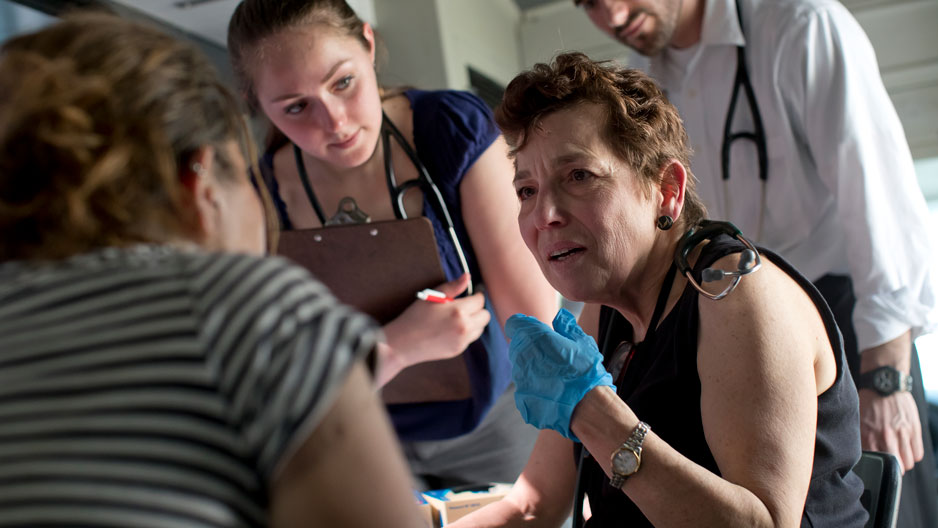
Title: Professor of medicine, Lewis Katz School of Medicine
How long have you been at Temple?
Since 1986—32 years this August
How many years have you been practicing medicine, and how have you seen medicine transform over those years in terms of the number of women working in the field and how they are recognized? What’s your advice for women pursuing professions that have historically been male-dominated?
I have been practicing medicine since 1984. As one example of the increase of women in medicine, when I was in my residency, I was one of three women in my class. Now classes are almost 50 percent women. I have seen more women enter fields that were rarely populated with women—surgery, orthopedics.
I think that there are still issues with women in medicine, despite the increase in numbers. We do not see these numbers in leadership—chairs, deans—that should be there to reflect the larger percentage of women in the profession.
I would not hesitate to tell women to enter medicine. There are so many options in medicine where you can develop a career to fit your passions. I would encourage women to pursue leadership trainings in order to be able to feel confident and ready to make inroads. Like many professions and bureaucracies, the role of women continues to evolve. Women’s skills and performance are not in question, and often, they outperform in many areas of the practice of medicine. Now they just need to take the helm of policy and leadership changes.
---
Theresa Powell
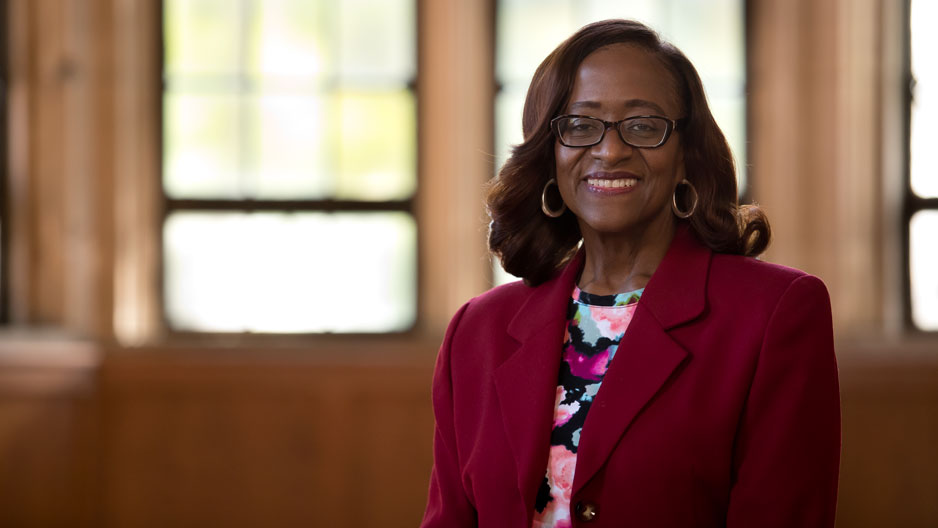
Title: Vice president for Student Affairs
How long have you been at Temple?
I have been at Temple since 2002, when I came here to serve as the vice president for Student Affairs, the role I currently have.
What is something you’ve learned in your career that helped you as a woman in a leadership role?
I’ve learned that you should pick your battles. Be selective about what you will fight for, because if you fight for everything, people will stop listening. I’ve realized, too, that people have higher expectations for women than they do for men. This can be intimidating, but it is also a challenge that can push you to do better. And once you’ve acquired some seniority, attempt to elevate other women. Encourage them and support them. We have more success as individuals when we work together as colleagues.
What advice would you give to young women on moving up the ladder into leadership roles?
Find a mentor. Find two if you can. Look for both male and female mentors and mentors both inside and outside of our organization. The wider the variety of experience they have, the more knowledge you will have access to. Put yourself out there: Present at national conferences and publish in your field, if that’s applicable. Do your best to establish a reputation on the local, regional or national level. Don’t be afraid to take risks. Or be afraid to take them, but take them anyway. Finally, civility and respect are essential in the workplace. Treat people the way you want to be treated, and you will earn their respect.
---
Sarah Powell
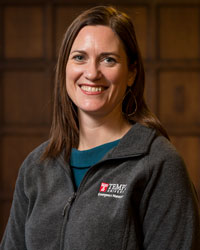
Title: Director of emergency management
How long have you been at Temple?
For 13.5 years. For 10 years, I was the project director for the Center for Preparedness Research Education and Practice (C-PREP) housed in the Department of Public Health. In 2014, I was recruited to be Temple’s first director of emergency management.
What’s your advice for young women aspiring to work in the emergency management world or similar fields?
Emergency management and public safety fields, in general, are often considered “male-dominated.” But that seems to be changing as more women seek out exciting fields that match their strengths and skills. I didn’t know emergency management was even a possibility when I studied medical anthropology as an undergraduate and then graduate student, but I found my way to public health preparedness and have been in this arena every since.
I happen to have four female students who currently work with me in the Office of Emergency Management, and all are tremendous additions to the emergency management world: driven, committed critical thinkers and planners who excel at everything they touch. As the field of emergency management professionalizes, we will continue to see its employment demographic change. At the present time, there is not an academic program at Temple devoted to emergency management, but we are able to seek out and attract students in fields such as public health, political science and facilities management who are interested in planning, preparedness and helping others. And that is what this field is ultimately about.
I welcome the conversation with any interested students, and I see it as part of my job to enable others to have exposure to the field. The more we can build a culture of preparedness at Temple, the stronger our institution will be.
Incidentally, I was an undergraduate at Temple, Class of 1999, and I was the first honors student whom Senior Director Ruth Ost advised. I was also a fencer on the NCAA Division I Women’s Fencing Team with Coach Nikki Franke, who has been the fencing coach for 46 years. Nikki Franke and Ruth Ost are two women mentors who made a great deal of difference in my life, and I can now thank my experience at Temple University for those valuable, lifelong connections. They are part of the reason (a big part) of why I am here today doing my best for the institution.
